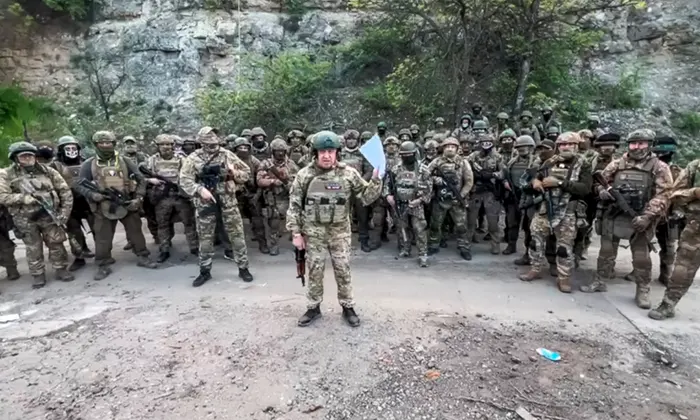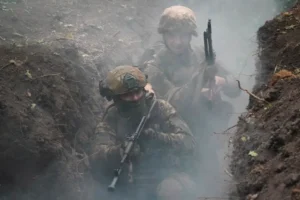An imminent British government decision to proscribe the Wagner mercenary group would speed up plans by Ukrainian refugees to sue the organisation for up to £5bn in damages in the UK courts, the lawyer leading the case has told the Guardian.
The UK government signalled it was prepared to proscribe the group, which is active in Russia and parts of Africa, on the basis of it being a terrorist group, a move that makes it illegal to help the group, Jason McCue said.
The UK imposed sanctions on the head of the group, Yevgeny Prigozhin, in 2020 and on the group itself in March 2022, immediately after the Russian invasion of Ukraine, in which Wagner has played a large part. UK ministers, led by the Home Office, have been looking at proscription for months, and bracing themselves for a highly critical report from the foreign affairs select committee on the government’s lack of grip on the Wagner phenomenon. Proscription is a ministerial decision guided by criteria set out in the Terrorism Act 2000.
The French national assembly voted on Tuesday to proscribe the group, a symbolic step that puts pressure on the French government and European Union to act.
Proscription across Europe would be likely to lead to action in the US, where a large group of senators are already backing a move that would make it increasingly hard for the group to transport personnel and weapons. The US earlier this year had sanctioned far more individual Wagner group members than the UK, as well as a Wagner group foundation.
McCue, a senior partner at McCue, Jury and partners and the head of the Ukraine civil society lawfare programme, said: “In the claim we filed on behalf of Ukrainians displaced and living in the UK, a designation by the British government that Wagner is a terrorist organisation will be invaluable in terms of speed and cost of persuading a British judge.
“We estimate that with 180,000 Ukrainian refugees in the UK we could claim a staggering £5bn through damages, displacement and PTSD etc. That money could be taken under existing international law from sanctioned Russian assets in the UK.”
He added: “A British designation would be welcome in itself, but if it led to an American designation then there would be even sharper teeth due to the American ability to go after Wagner group supporters extrajudicially. Anybody who provided material support to that organisation – even if they are non-US citizens – would then be subject to US prosecution.”
McCue said further civil cases would be attempted in Canada, Israel, the US and Europe depending on the degree of crowdfunding, with the aim of not just targeting the head of the Wagner group, but those who have facilitated it. He has recently returned from Ukraine discussing with the president’s office the means to gather further evidence, including the use of the Ukrainian government’s DIYA app to contact more Ukrainians to take cases against Wagner.
He said: “There is no doubt that Wagner has engaged in terrorism in Ukraine, and the case will show that Vladimir Putin paid for these acts of terrorism.”
He said the UK designation in itself would have a practical impact on the Wagner group’s operations. “If you start designating, what you do is stigmatise. A lot of soldiers who go and work for mercenary groups have spent their whole lives fighting terrorism around the world. They would not want to go to work for a terrorist group. They will also not want restrictions on their movements. What you create is, you start shutting down and weakening the group and its operational activities straight away.”
McCue, who gave evidence to the still incomplete foreign affairs select committee inquiry into the Wagner group, said he had no doubt the group used terrorist methods. He said: “You have the close-targeting IEDs which are in breach of the Geneva conventions, assassination attempts on President Zelenskiy, threats of chemical and biological weapons on the battlefield, war crimes, promotion of atrocities and terrorism and sanction-busting for the war machine.
“If you need an example to prove anything else, who else but a terrorist would plant explosives around a nuclear facility? It is the exact definition of terrorism.”
Traditionally proscriptions of organisations have been made against transnational groups rather than groups linked to a recognised state.
The UK government accepts that Wagner is linked to the Russian government but is not an arm of the government. Members of the foreign affairs select committee after cross-examining ministers came away with the impression that no one in the Foreign Office had a grip on the importance of the Wagner group. They were also horrified that a civil servant had waived sanctions to allow a lawyer acting for Prigozhin to travel to St Petersburg to help prepare a libel action against Eliot Higgins.
Reports about an imminent UK government proscription first appeared in February, but were revived in the Times, which suggested on Wednesday that a decision was imminent.
In Ukraine, Bakhmut has been under Russian attack for more than nine months, with Wagner group mercenaries leading repeated attempts to advance on what was once a city of 70,000.
Prigozhin, said in a social media message on Monday that his troops were beginning to receive the ammunition needed to press their advance.
Source : TheGuardian











